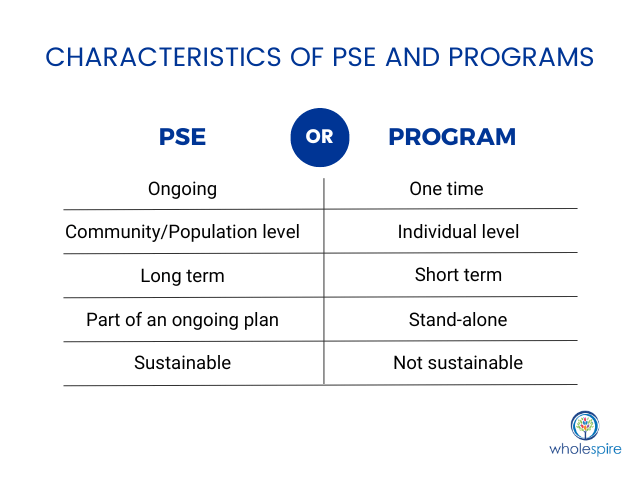Wholespire provides grant opportunities to communities across South Carolina for implementing a policy, system or environmental (PSE) change project. It’s a concept that can be challenging to explain and understand. To prepare you for any upcoming grant opportunities from Wholespire, we want to help you determine if your project is a PSE change or a program. We also want to help you save time before applying for a grant that will not get funded because it is considered to be a program.
What is a Program?
Programs typically occur over a short period of time and only focus on individual behavior change. They are often considered health education rather than community health improvement. Hospitals and health centers often provide programs that teach people living with chronic diseases how to manage their condition through diet and exercise.
What is PSE Change?
Policy, systems and environmental change make healthier choices more practical and readily available to all members of a community and influence community health and well-being. They are often part of an ongoing project or plan. PSE change reaches more people and leads to more impactful, long-term changes in community health.

PSE Change + Programs = Greater Success
Wholespire focuses on whole community health through PSE change, while other organizations focus on individual behavior change through programs. We support the use of programs to reach individuals because programs and PSE change complement each other and can lead to even greater success than a stand-alone program.
Scenario 1: One-time Event
A municipality receives a Wholespire mini-grant to create a paved walking trail in a local park. They host a ribbon-cutting ceremony on opening day that features exhibitors offering health education information and giveaways for community members. The one-time event is a tactic to get community members to the new trail.
Scenario 2: Traditional Program
A community health needs assessment shows eating fruits and vegetables is important to community members, and they don’t eat enough fruits and vegetables because they don’t know how to prepare and cook with them. The local health coalition chooses to host a free Cooking Matters program to teach individuals how to cook with fresh produce. To supplement the classes, the coalition partners with the local community garden. Garden organizers donate produce from the garden for the cooking demonstrations and give free produce boxes to participants.
